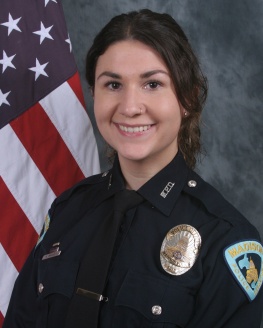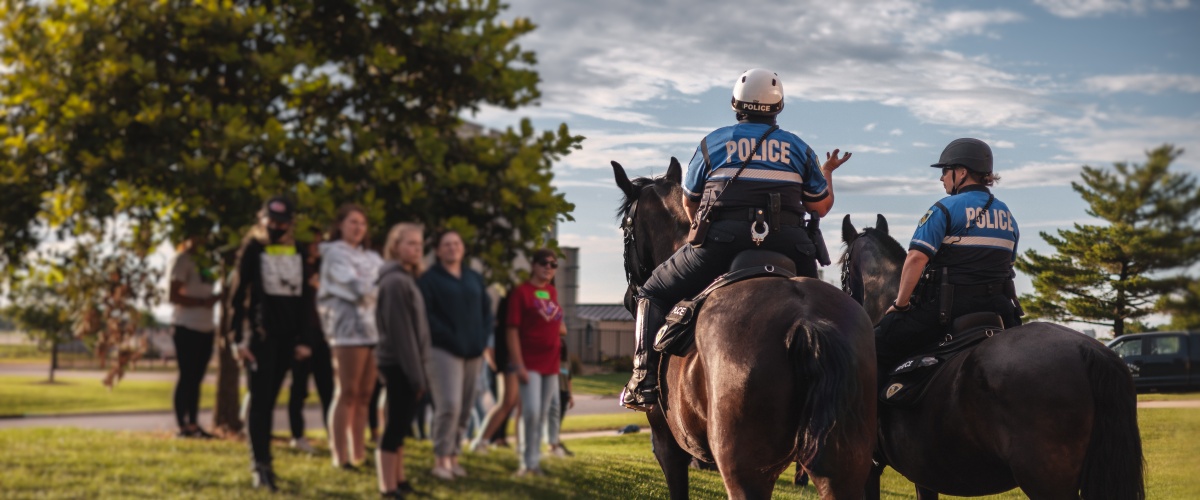Mental Health Unit
Who we are
- 1 sergeant
- 6 officers
- mental health liaison officers; we have 40-50 patrol officers who receive additional training to become a mental health liaison officer
What we do
- provide a coordinated, professional, and compassionate response to individuals (and their families) affected by mental illness
- work collaboratively with partner agencies to achieve improved outcomes for individuals affected by mental illnesses or suffering a crisis by connecting them to needed services and diverting them away from the criminal justice system whenever possible
- reduce calls for police services related to mental health crises
Meet Our Unit
-
Sergeant Sam Brier
-

Officer Brandon Koziol
bkoziol@cityofmadison.com
Central District -

Officer Haley Massey
hmassey@cityofmadison.com
East District -
Officer Mackenzie Cole
mcole@cityofmadison.com
West District -
Police Officer Dustin Hodgson
dhodgson@cityofmadison.com
South District -

Police Officer Nicholas Ellis
nellis@cityofmadison.com
North District -
Police Officer Sebastian So
sso@cityofmadison.com
Midtown District
Our Mission
The mission of the Madison Police Department Mental Health Unit is to provide a coordinated, professional and compassionate police response to individuals affected by mental illness and their families. The Mental Health Unit works collaboratively with partner agencies to achieve improved outcomes for individuals affected by mental illnesses or suffering a crisis by connecting them to needed services and diverting them away from the criminal justice system whenever possible. The goals of the Mental Health Unit are to improve safety for officers and all members of the community and reduce calls for police service related to mental health crises.
Our Values
- Problem solving: We believe in identifying the underlying issues creating police calls and reducing them.
- Collaboration: We engage with partners from across the government, civil society, families and consumers to improve systems, relationships, and outcomes.
- Diversion: We aim to reduce the involvement of criminal justice in mental health issues and the criminalization of mental illness.
- Professional development: We seek increased knowledge and expertise within the unit and to share our knowledge and experience with the department at large.
Our Training
The foundation of MPD’s overall mental health programing is our well-trained workforce. The training that all MPD officers receive in our in-house, pre-service academy on mental health and behavioral health crisis topics surpasses the national standard for specialist mental health officers. The high quality of our training is crucial, because MPD officers assigned to Patrol Services are the first responders to a great number of crises and incidents that are related to mental health concerns. MPD officers are trained to conduct thorough investigations and make observations of behaviors, signs, and symptoms that may suggest mental health as a contributing factor. Our pre-service curriculum incorporates a panel of persons with lived experiences, presentations from clinicians and community partners, and scenario-based training.
Officers are also trained to communicate and consult with our community partner, Journey Mental Health. Journey staffs a 24/7 crisis line for the general public; and they evaluate patients to identify mental illness, assess risk, and determine the appropriate level of care needed for individuals experiencing a crisis.
Mental Health Liaison Officers
Our Mental Health Unit is supplemented by Mental Health Liaison Officers (MHLOs). MHLOs maintain their primary assignments in Patrol, but owing to their interest and spirit of continuous improvement, they attend two additional training days throughout the year and take on additional tasks and responsibilities related to mental health-related crisis response. MHLOs work within and across districts to provide coordinated, consistent, and collaborative crisis response. Since the inception of the program in 2004, interest in the MHLO role has seen consistent growth. Our MHLOs represent all shifts and districts, and represent both the ranks of Police Officer and Sergeant.
Our History
Since 2015, MPD has had a specialized team of full-time Mental Health Officers. This team consists of six full-time Mental Health Officers (MHOs), and three embedded Law Enforcement Crisis Workers (LECWs). Our MHOs work out of each of the six MPD district stations, and are supervised by one MHU Sergeant. Our LECWs divide their time amongst the various MPD districts and are supervised by one LECW Manager. The MHU is organizationally positioned within MPD’s Community Outreach Section.
MHOs and LECWs regularly assist MHLOs and Patrol officers on active calls for service, striving to uphold the MHU values of problem solving and diversion. MHOs and LECWs share responsibilities that include: coordinating efforts with partner agencies; developing safety plans for individuals who would benefit from a unique emergency response; conducting follow-up tasks and engaging in proactive visits with community members living with mental illnesses; attending relevant meetings with stakeholders; and facilitating specialized trainings and community-based presentations.
Our team’s close partnership with Journey Mental Health allows our MHOs to co-respond with LECWs into the field, to assist with active crisis calls for service. In many cases, our LECWs provide the clinical context that informs our officers to reach better dispositions and aims to divert individuals from the criminal justice system. In other cases, our LECWs collaborate with MHOs to plan and carry out follow-up with individuals before or after a crisis occurs.
Our MHOs have all completed the 40-hour Crisis Intervention Team (CIT) training, which is a National Alliance on Mental Illness (NAMI) initiative designed to improve the outcomes of police interactions with people living with mental illnesses. CIT is a nationally-recognized curriculum and our unit is proud to assist with local offerings of CIT and of Crisis Intervention Partners (CIP) training, the latter of which is a 16-hour training designed for wide-ranging audiences. Our MHOs seek further continuing education opportunities through various providers, notably through NAMI Wisconsin, Association of Threat Assessment Professionals (ATAP), Dane County’s Collaborative Stabilization Coalition, the Wisconsin Department of Health Services, and the Wisconsin Department of Justice.
MPD is a National Model for Police-Mental Health Collaboration
MPD's Mental Health Unit is one of only fifteen Police-Mental Health Collaboration (PMHC) learning sites selected by the Council of State Governments Justice Center and the U.S. Department of Justice’s Bureau of Justice Assistance. As a learning site, our unit fields inquiries and hosts visitors from law enforcement agencies around the county who seek support to begin or advance behavioral health units of their own. Moreover, our distinction as a learning site provides ongoing training and professional development opportunities for members of our unit. Taken in tandem, our MHU and Madison’s Community Alternative Response Emergency Services (CARES) program are on the cutting edge of co-response initiatives that span the nation. Since the Fall of 2021, the CARES program that teams Madison Fire Department community paramedics and Journey Mental Health crisis workers has been active in Madison. Our Dane County 911 Center routinely dispatches CARES to calls that do not warrant a police response, and MPD officers have the ability to divert active calls to CARES that may also be appropriate. The CARES program expands the services available to the Madison community, and we couldn’t be happier to have them as a partner.
Our mental health unit now offers free community-based presentations (the “Crisis Response in Madison” series) to local agencies and organizations. If you are interested in hosting a presentation from our unit, please reach out to us.
Inside MPD
- Chief's Office
- Districts
-
Units & Teams
- Community Outreach Groups
- Community Outreach and Resource Education (CORE)
- Community Policing Teams
- Crime Scene Investigators (Forensic Services Unit)
- Dane County Narcotics Task Force
- Gang and Neighborhood Crime Abatement Team (GNCAT)
- Honor Guard
- Investigative Units
- K9 Unit
- Mental Health Unit
- Mounted Patrol Unit
- Neighborhood Police Officers and Neighborhood Resource Officers
- Special Events Team (SET)
- Special Weapons and Tactics/Crisis Negotiations Team (SWAT)
- Support Staff/Units
- Traffic Enforcement Safety Team (TEST)
- Training Team
- Unmanned Aircraft Systems (UAS)
- Police and Fire Commission
If you are suffering a mental health emergency and need our services call 911.
Non-emergency inquiries:
MHOTeam@cityofmadison.com
608-261-5579
Media Resources
Madison Police Department adapts to mental health crisis
In Focus: Madison PD mental health unit a success
Compassion and Coordination: MPD's approach to helping those with mental illness
How MPD Approaches De-Escalation and Mental Health Training
MPD Contracts with third-party service for mental health transports
Madison Police Department Works to Address Mental Health Crises in the Community




